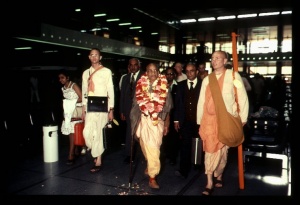SB 11.5.31

A.C. Bhaktivedanta Swami Prabhupada
Please note: The synonyms, translation and purport of this verse were composed by disciples of Śrīla Prabhupāda
TEXT 31
- iti dvāpara urv-īśa
- stuvanti jagad-īśvaram
- nānā-tantra-vidhānena
- kalāv api tathā śṛṇu
SYNONYMS
iti — thus; dvāpare — in the Dvāpara age; uru-īśa — O King; stuvanti — they praise; jagat-īśvaram — the Lord of the universe; nānā — various; tantra — of scriptures; vidhānena — by the regulations; kalau — in the age of Kali; api — also; tathā — in which manner; śṛṇu — please hear.
Translation and purport composed by disciples of Śrīla Prabhupāda
TRANSLATION
O King, in this way people in Dvāpara-yuga glorified the Lord of the universe. In Kali-yuga also people worship the Supreme Personality of Godhead by following various regulations of the revealed scriptures. Now kindly hear of this from me.
PURPORT
The words kalāv api, "in Kali-yuga also," are very important in this verse. It is well known that Kali-yuga is an irreligious age. Thus it is surprising that in such a completely irreligious age the Supreme Lord is worshiped. Therefore it is stated kalāv api, "even in Kali-yuga." In Kali-yuga the incarnation of the Personality of Godhead does not directly assert Himself to be the Personality of Godhead, but rather He is detected by expert devotees in accordance with the revealed Vedic scriptures. Similarly, Prahlāda Mahārāja states in Śrīmad-Bhāgavatam (SB 7.9.38):
- itthaṁ nṛ-tiryag-ṛṣi-deva-jhaṣāvatārair
- lokān vibhāvayasi haṁsi jagat pratīpān
- dharmaṁ mahā-puruṣa pāsi yugānuvṛttaś
- channaḥ kalau yad abhavas tri-yugo 'tha sa tvam
"In this way, my Lord, You appear in various incarnations as a human being, an animal, a great saintly demigod, a fish or a tortoise, thus maintaining the entire creation in different planetary systems and killing the demoniac principles. According to the age, O my Lord, You protect the principles of religion. In the age of Kali, however, You do not assert Yourself as the Supreme Personality of Godhead, and therefore You are known as Triyuga, or the Lord who appears in three yugas." Thus it is understood that it is difficult for common people in Kali-yuga to recognize the incarnation of the Lord since in this age the Lord's appearance is slightly concealed.
According to Śrīla Bhaktisiddhānta Sarasvatī Ṭhākura the word nānā-tantra-vidhānena indicates the importance in Kali-yuga of the Vaiṣṇava scriptures known as the Pañcarātras or Sātvata-pañcarātras. It is stated in the Śrīmad-Bhāgavatam, strī-śūdra-dvija-bandhūnāṁ trayī na śruti-gocarā: (SB 1.4.25) in Kali-yuga it is impossible for ordinary people to perform highly technical Vedic sacrifices or the unbearable penances of the mystic yoga system. Such standard Vedic processes are practically inaccessible for the spiritually retarded population of Kali-yuga. Therefore the simple process of glorifying the Personality of Godhead by chanting His holy names is essential in this age. Such devotional processes as chanting the holy names of the Lord and worshiping His Deity form are elaborately described in the Vaiṣṇava śāstras known as Pañcarātras. Such tantric scriptures are referred to in this verse, and it is stated that in Kali-yuga these devotional processes, taught by great ācāryas such as Nārada Muni, are the only practical means for worshiping the Lord. This will be more clearly explained in the following verse.